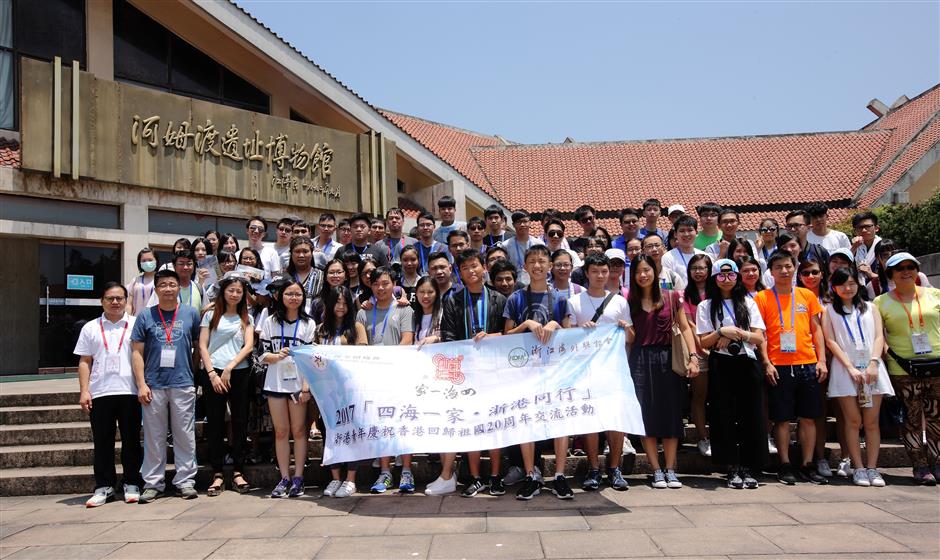Special bond to develop, create and share as one
NINGBO and Hong Kong share a special connection thanks to Ningbobang (the collective term of Ningbo entrepreneurs doing business outside of the city) as many of them moved to Hong Kong and had success there in the 20th century. The two cities are continuing the connection among young generations by promoting communication as well as cooperation in culture, education and economy this year.
Organized by Hong Kong and Zhejiang governments to celebrate the 20th anniversary of Hong Kong’s return to the motherland this year, over 2,000 Hong Kong young people, with an average age of 26, visited 11 cities in Zhejiang Province early this month, including 240 people having a trip to Ningbo.
Hong Kong is the biggest overseas investment source for Ningbo as the latter used a total of US$890 million investment from the former between January and May this year, accounting for 54.4 percent of all overseas investment used in Ningbo, according to local government.
Their first stop in Ningbo is Ningbobang Museum in Zhenhai District, which was specially built in 2009 to dedicate to Ningbobang and the profiles of Ningbo entrepreneurs were showed there through texts, photos and personal items.
“I learned that Ningbo is the ancestral home of many famous people in Hong Kong, such as Tung Chee-hwa, our first chief executive, whose father was born in Ningbo,” said Plum Chiu, 16, a student in St Catharine’s School For Girls (Kwun Tong), said after visiting Ningbobang Museum. Other famous people of Ningbobang include Run Run Shaw (1907-2014), a Hong Kong showbiz tycoon and philanthropist, and Yue-kong Pao (1918-1991), a shipping magnate.
“To see a thing once is better than to hear about it a hundred times and the activity held is meaningful for young people from Hong Kong to understand the history, culture, city features as well as the development prospect in Ningbo,” said Tang Yijun, Party secretary of Ningbo.
Manufacture industry is a mainstay in Ningbo and the city is piloting a “Made in China 2025” project by promoting smart manufacture.
“We saw robots replacing man labors in factories and we recognize the manufacture progress in the Chinese mainland as the companies are now able to produce some high-tech products that could not be produced in the past time,” said Rio Fung, 26, who works for community service in Hong Kong. He made the comments after visiting SAIC Volkswagen Ningbo plant in Hangzhou Bay New Zone, Fotile, the local kitchenware manufacturer in Cixi City and Konfoong Materials International Co Ltd, the local ultra-high purity metal materials manufacturer in Yuyao City.
Jacky Peng, 19, a student of The Chinese University of Hong Kong, said the development in Ningbo is sustainable as he saw not only the construction of modern factories but also environmental protection, long history and rich culture in the city as they visited Hangzhou Bay Wetland Park and Hemudu Site as well as the old residence of philosopher Wang Yangming (1472-1529) in Yuyao City.
The 63.8-square-kilometer Hangzhou Bay Wetland is a protected coastal wetland and an important habitat for birds.
Hemudu Site is one of the oldest archeology discoveries in China, featuring Neolithic archaeology discovery traced back to 7,000 years ago.
Archaeologists found rice planted by ancestors under the layers of soil in the site, which proved the long history of civilization in Ningbo. A museum was built in 1993 in order to show Neolithic culture through items exhibition combined with text explanation and also to record the long history of Ningbo.
The long history cultivated the rich culture in the city such as the philosophy of Yuyao-native Wang Yangming, who advocated the unity of actions and knowledge in the Ming Dynasty (1368-1644). In the old residence of Wang Yangming, visitors read the articles as well as literature related with Wang and learned that his thoughts once contributed to Meiji reform in Japan.
“To maintain a sustainable growth, a city should retain culture and care for people while pursuing fast economic growth,” said Peng.

Young people from Hong Kong visited Hemudu Site in Ningbo during their trip to Zhejiang Province.
















